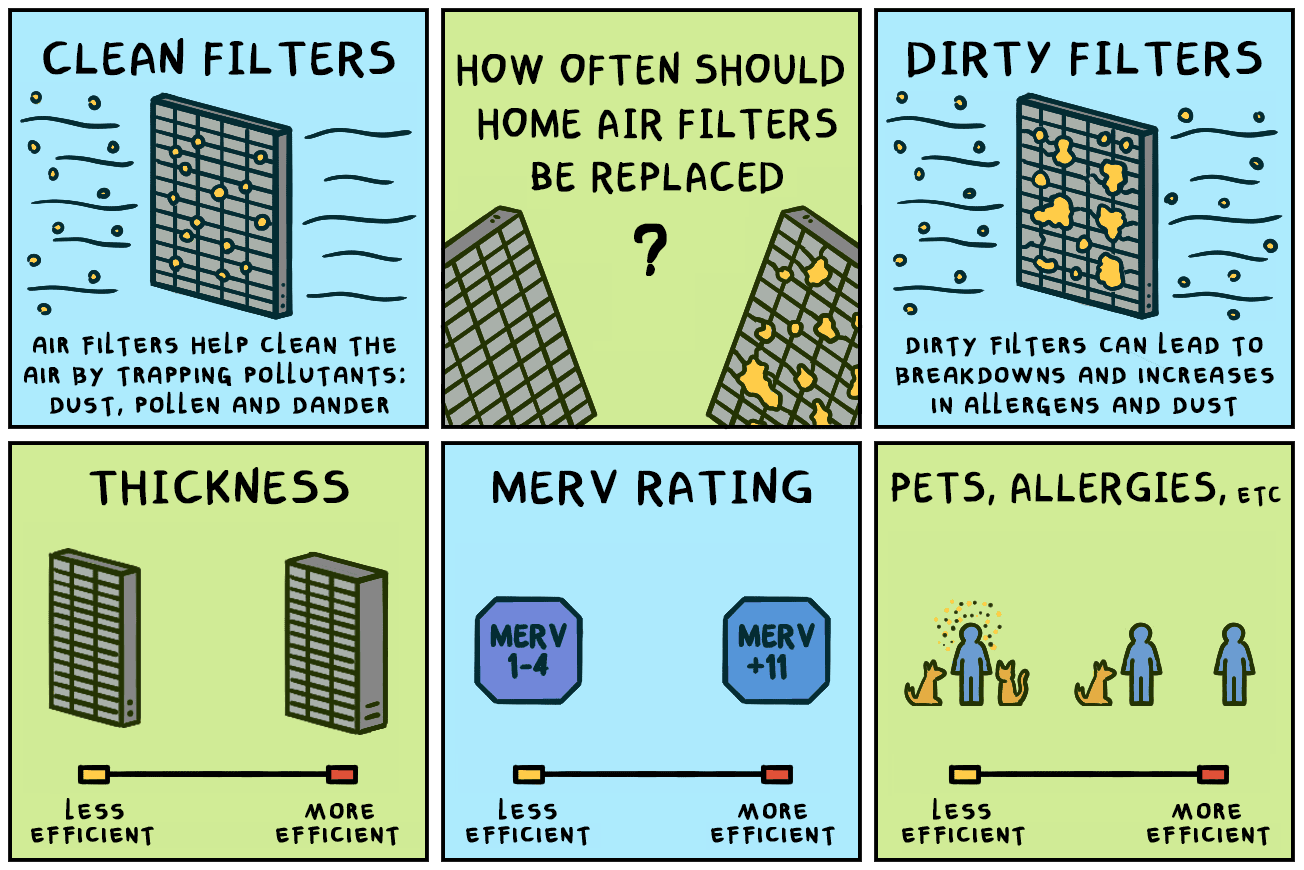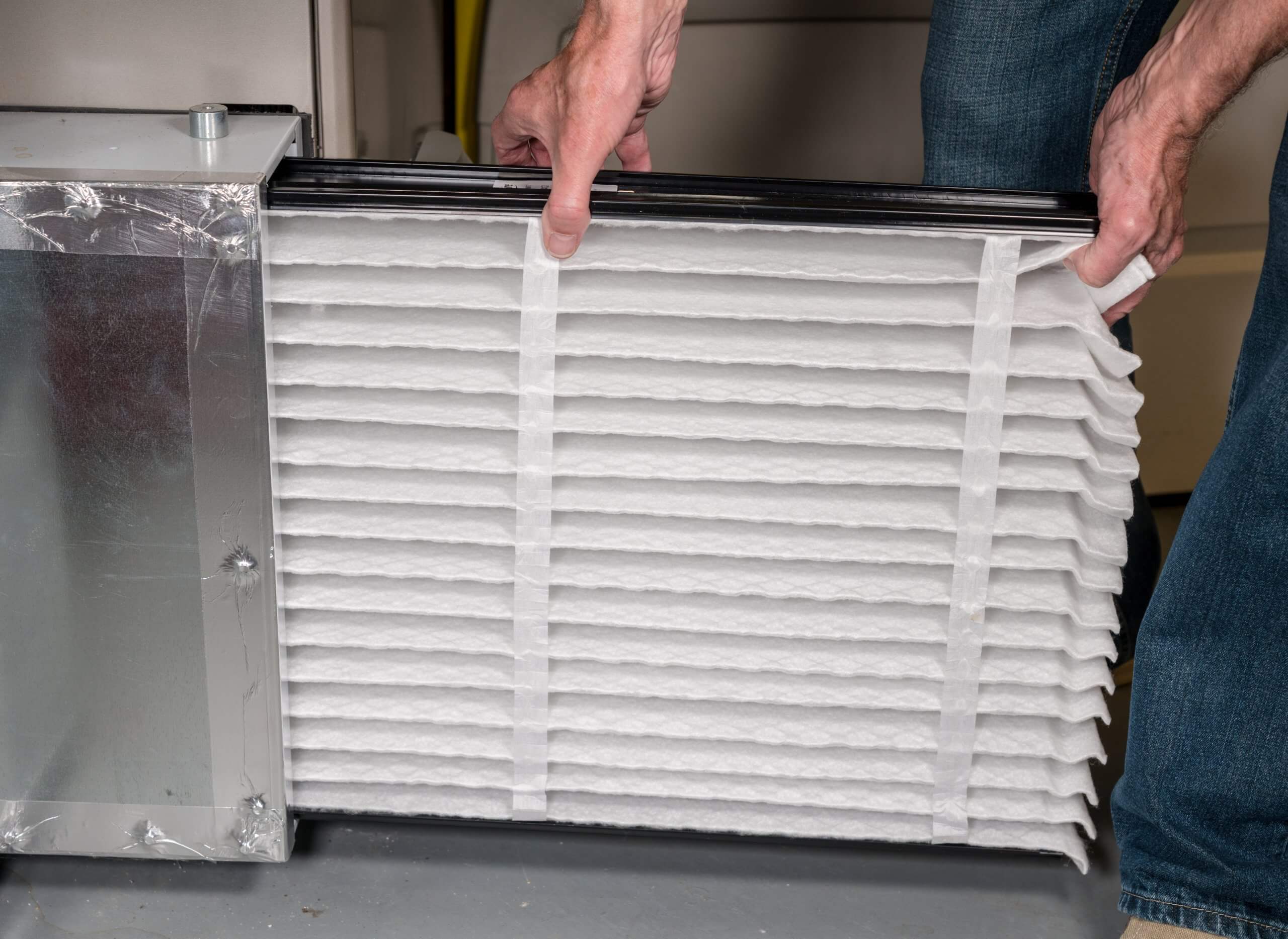You might believe that air filters serve one basic purpose: to clean the air that circulates throughout your home. However, that’s not technically true. The original purpose of home air filters was to prevent the HVAC system from damage. Improved indoor air quality is simply a byproduct! Air filters help clean the air indoors by trapping harmful pollutants such as dust, pollen and dander. For healthy air quality, it’s important to know when to change home air filters.
 Ditch the dust and allergens! MERV 13 filters offer superior air quality by trapping microscopic particles like pollen, mold spores, and even some bacteria. Breathe easier and live healthier – Shop MERV 13 Air Filters →
Ditch the dust and allergens! MERV 13 filters offer superior air quality by trapping microscopic particles like pollen, mold spores, and even some bacteria. Breathe easier and live healthier – Shop MERV 13 Air Filters →How Often Should You Change Home Air Filters?
The frequency with which you should change your home air filter depends on the type of filter, its thickness, the MERV rating and some special conditions. Let’s break down each factor.
Thickness
The standard basic air filter is a 1-inch thick disposable filter. This type of filter needs to be replaced every 30-90 days. Other home air filters range from roughly 2-5 inches in thickness. It is generally recommended to replace such filters every four to six months as a baseline. However, thickness alone is not enough to determine how often to change the filter!
Filter Type
- Pleated: A pleated air filter helps reduce the circulation of dust and other air pollutants due to greater surface area thanks to its accordion design. Pleated filters can be made of various fabrics or materials. Their efficacy depends on the material type.
- Fiberglass: A fiberglass filter is fairly common and disposable. They are loosely wound and are not the best IAQ-focused filter choice.
- Washable: Washable filters are reusable, making them an environmentally friendly choice. However, they must be well-maintained in order to prevent mildew and mold growth, thus they require frequent maintenance.
- HEPA: High Efficiency Particulate Air (HEPA) filters are extremely effective with regard to filtration, but they significantly reduce airflow for the average home HVAC system.
- Activated Carbon: An activated carbon filter effectively reduces VOCs and odors, but struggles to remove particulates such as dust, pollen and mold.
- Media: Media filters, and even better, high-efficiency media filters offer superb air filtration without reducing airflow. It is the happy medium of air filters.
Special conditions to consider include whether there are allergy and asthma sufferers in the home or pets.
Factors That Shorten Filter Lifespan
- Household pets: Pet hair and dander quickly clog your filter
- More furry friends: Multiple pets further intensify the strain on your filters
- Household size: More people = more dust, hair, and particles for the filter to handle
- Respiratory issues: Those with allergies or asthma need cleaner air, leading to faster filter buildup
- Nearby construction: Dust and debris from construction work enter your home and impact the filter
- Outdoor pollution: Areas with heavy pollution strain your filter further
The following chart provides a breakdown of how often to routinely check (at a minimum) your home air filter for buildup, based on various factors.
And again, considering the wide range of air filters and different efficacy levels, view the ranges as an average!
| Factor | Replacement Range |
|---|---|
| Someone in the home suffers from allergies or asthma | 30 to 45 days |
| Ordinary Home, No Pets | ~ 90 days |
| Ordinary Home, One Pet | ~ 60 days |
| Ordinary Home, Multiple Pets | 20 to 40 days |
| Single-Occupant Home, No Pets | ~ 180 days |
All estimates are tricky to do as a generalization. They are based on the average family home with an average occupancy level. Filter rating is also a very important factor.
MERV Rating
- What’s a MERV? Minimum Efficiency Reporting Value (MERV) rates filters on how effectively they trap airborne particles of different sizes.
- Higher numbers, cleaner air: Higher MERV ratings filter smaller particles (dust, pollen, mold spores, etc.)
- The trade-off: High-efficiency filters (MERV 13+) catch more but restrict airflow, potentially requiring more frequent replacements.
- Recommendations:
- Average Home: MERV 8-11 balances cost and filtration
- Allergies/Asthma: Consider MERV 11-13, monitor filter changes
- Pets & Pollution: May warrant MERV 13, more frequent replacement
Overall, filters with lower MERV ratings should be checked and replaced more often than higher-rated filters. An air filter with a MERV 1-4 rating is significantly less efficient at filtering out pollutants. Check this MERV range often and change the filter whenever pollutant buildup is clear.
The middle-efficiency range of MERV 5-10 likely requires filter changes somewhere around two or three months. However, this mid-range really varies depending on other factors and filter material.
Air filters with a MERV 11 rating or higher rating can usually go between three and six months before replacing. Specifically, for high MERV ratings and greater thickness, these filters easily require only two filter changes per year.

If you’re still unsure, more than likely, the home air filter you choose will have specific recommendations on the packaging.
The bottom line: prioritizing your and your family’s health and healthy indoor air means a clean air filter should be the priority.
With this in mind, to ensure the cleanest air filter, you must take into account all of the factors listed above to determine the best filter timeline for your space.
Specific Filter Types
- HEPA Filters:
- Pros: Exceptional at capturing allergens and tiny particles (MERV 17+)
- Cons: Expensive, require frequent replacement due to clogging
- Ideal for: Severe allergies, high pollution areas
- Washable Filters:
- Pros: Reusable, potentially lower long-term cost
- Cons: More frequent cleaning, some MERV ratings are lower.
- Best for: Budget-conscious households, milder filtration needs
- Smart Filters:
- Pros: Built-in sensors monitor filter status, send change alerts
- Cons: Most expensive, may not offer highest MERV ratings
- Ideal for: Tech-savvy users, those who struggle with regular changes
Important to remember: Filter lifespan depends not only on type but also on your home’s specific air quality. Always check the manufacturer’s recommendations as a starting point.
What Happens if You Don’t Change Your Air Filter?
Neglecting home air filter maintenance can result in a plethora of home and health issues.
Reduced Airflow: A dirty air filter is clogged with dust and debris, which also reduces airflow. Ultimately, your HVAC unit will have to work harder to compensate, potentially leading to system failure or costly repairs.
System Failure: An HVAC unit that is working hard to circumvent clogged air filters is subject to overheating and other issues. Once a unit overheats, it is likely to break resulting in expensive repairs.
Increased Allergens: Those who suffer from allergies may notice increased fatigue, headaches and cold-like symptoms. This is due to the fact that major allergens aren’t being filtered out as effectively. Without a clean air filter, when the air is blowing, these particles circulate throughout your home.
Electricity Bill Increase: Reduced airflow from a dirty filter greatly stresses your AC unit and HVAC system. All of which increases your electricity or gas bill.
Overheating AC Unit: If you notice an increase in the actual temperature of your outdoor condenser unit, it may be indicative of a dirty air filter. This is determined by touching the back of the outdoor unit.
Dust: If you notice more dust settling on surfaces near the vents in your home, it could be another sign that the air filter is dirty. Check surfaces further away from the vents, if they are not as dusty, then the air filter is the problem. Also, as a test, hang a white sheet within several inches of the vent and see if the sheet turns gray, which again shows it’s time to change the home air filter.
Which Air Filter Is Best for You?
Changing home air filters is quick and easy! If you’re looking for the perfect home air filter, one that provides your space with cleaner, filtered air and healthy indoor airflow, look no further than a MERV 13 pleated media filter. We suggest this option because it truly combines the best features of every category.
You’ll likely only have to replace a MERV 13 filter every six months! (Depending on those special conditions, of course.) By nature these filters are low maintenance, saving you both time and money. They’re also high-efficiency, meaning improved overall air quality and a healthier indoor space!
Replacing Home Air Filters FAQ
Absolutely not! Running your HVAC without a filter is like driving your car without an air filter. It allows dust, dirt, allergens, and other harmful particles to circulate freely in your home, negatively impacting your air quality and potentially damaging your HVAC system.
A clogged air filter restricts airflow, making your HVAC system work harder and less efficiently, leading to higher energy bills. Additionally, the trapped particles can worsen allergies and respiratory issues, and even damage your HVAC system over time.
The size of your air filter directly impacts its lifespan. A properly sized filter has the optimal surface area to capture dust and particles without restricting airflow. Using a smaller filter forces it to work harder, clogging faster, while a larger filter may not fit snugly and allow unfiltered air to bypass it.
Yes, but with caveats. Running the fan continuously circulates air through the filter more frequently. However, the filter only effectively traps particles when the AC or furnace is actively running. Additionally, continuous fan operation increases energy usage.
Yes! Restricted airflow from a dirty filter can make your AC work too hard, leading to the evaporator coil freezing. This further blocks airflow and potentially damages your unit.



